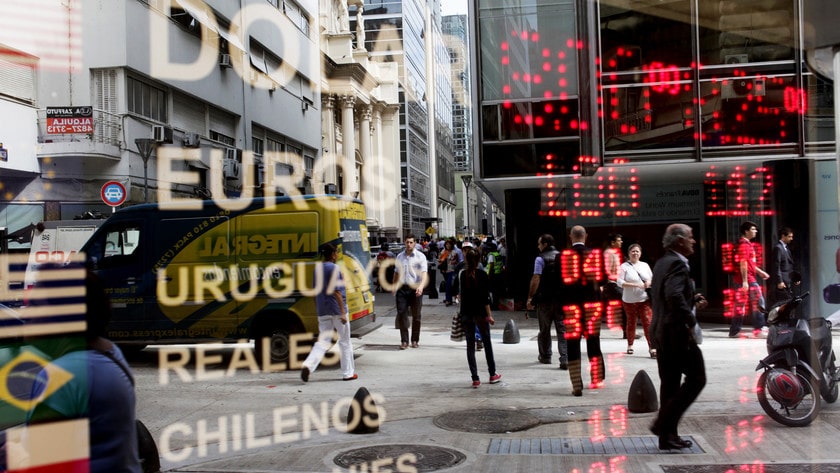Foreign-exchange dealers say they have the solution to the high-frequency trades eroding banks’ profits across financial markets.
A currency-dealing platform known as ParFX, established in 2011 by firms from Deutsche Bank AG to Citigroup Inc., was approached last month by banks asking if its technology could be applied to other asset classes, Chief Executive Officer Dan Marcus said. The system works by pausing trades at random to prevent dealers with high-powered computers from jumping in front of investors and gaining an advantage.
“These banks do need to trade foreign exchange because it’s their business and they’re hedging their currency exposure across the world,” London-based Marcus said in an April 15 interview. “They would rather trade in an environment that they can trust.”
High-frequency trading is coming under unprecedented scrutiny with the publication last month of Michael Lewis’s book “Flash Boys,” investigations by U.S. regulators and tough new rules approved this week by the European Union. Dealers use technology to execute orders in thousandths or even millionths of a second, profiting from tiny discrepancies in security prices across different trading venues.
Prime Target
Relatively light regulation and high volumes make the $5.3 trillion-a-day foreign-exchange market a prime target for high-frequency traders. More than 35 percent of spot currency volume in October was by speed traders, up from 9 percent five years earlier, according to Boston-based consultancy Aite Group LLC.
About 30 percent to 35 percent of currency transactions on ICAP Plc’s EBS system are high-frequency trades, the Bank for International Settlements said in a December report. Bloomberg LP, the parent company of Bloomberg News, competes with EBS in providing news, information and trading systems.
“Foreign exchange has definitely been the area that people have moved toward in the last 12 to 18 months,” Hugh Cumberland, a manager at Colt Technology Services Group Ltd. in London, said in an April 3 phone interview. The company provides high-speed networks to financial-services companies. Tougher rules in other markets are “an encouragement for HFT traders to look to other areas like foreign exchange,” he said.
Dealers Frustrated
ParFX was set up after a group of the largest currency dealers approached a unit of Swiss broker Cie Financiere Tradition SA (CFT), frustrated by the arrival of high-frequency traders on many of their existing platforms.
The system started trading in July, and now executes deals for 15 firms including Deutsche Bank, Citigroup, Barclays Plc and UBS AG, the four biggest currency dealers. It expects to have 25 percent more clients by the end of April.
ParFX offers a transparent marketplace and subjects orders to random pauses of about 20 to 80 milliseconds, and “is the industry’s effort to heal itself,” according to Marcus.
“The idea of randomizing is, I guess, a potential solution,” John Adam, global head of product management at New-York based Portware LLC, which offers systems for high-frequency trading, said in an April 15 phone interview. “It’s placing a lot of faith in the randomizing, really. If somebody can figure out a pattern in that randomizer algorithm, that would be immensely problematic.”
Profits Slump
Currency dealers are fighting back against high-speed trading as profits from foreign exchange tumble.
The trillions of dollars that central banks pumped into markets in the wake of the global financial crisis have damped the trends that currency dealers rely on to make money. Foreign-exchange trading revenue at U.S. commercial banks totaled $1.53 billion in the fourth quarter of 2013, compared with an average $1.7 billion over the past two years, the Comptroller of the Currency said on March 31.
The foreign-exchange market has been hit by investigations of its own. At least a dozen authorities on three continents are examining allegations, first reported in June by Bloomberg News, that traders colluded to manipulate benchmark rates. The probes have seen dealers suspended from the U.S. to Singapore and Switzerland. No firms or traders have been accused of wrongdoing by government authorities.
High-frequency trading has its share of supporters, who say its ability to reduce spreads, or differences between the prices to buy and sell an asset, cuts costs for investors.

